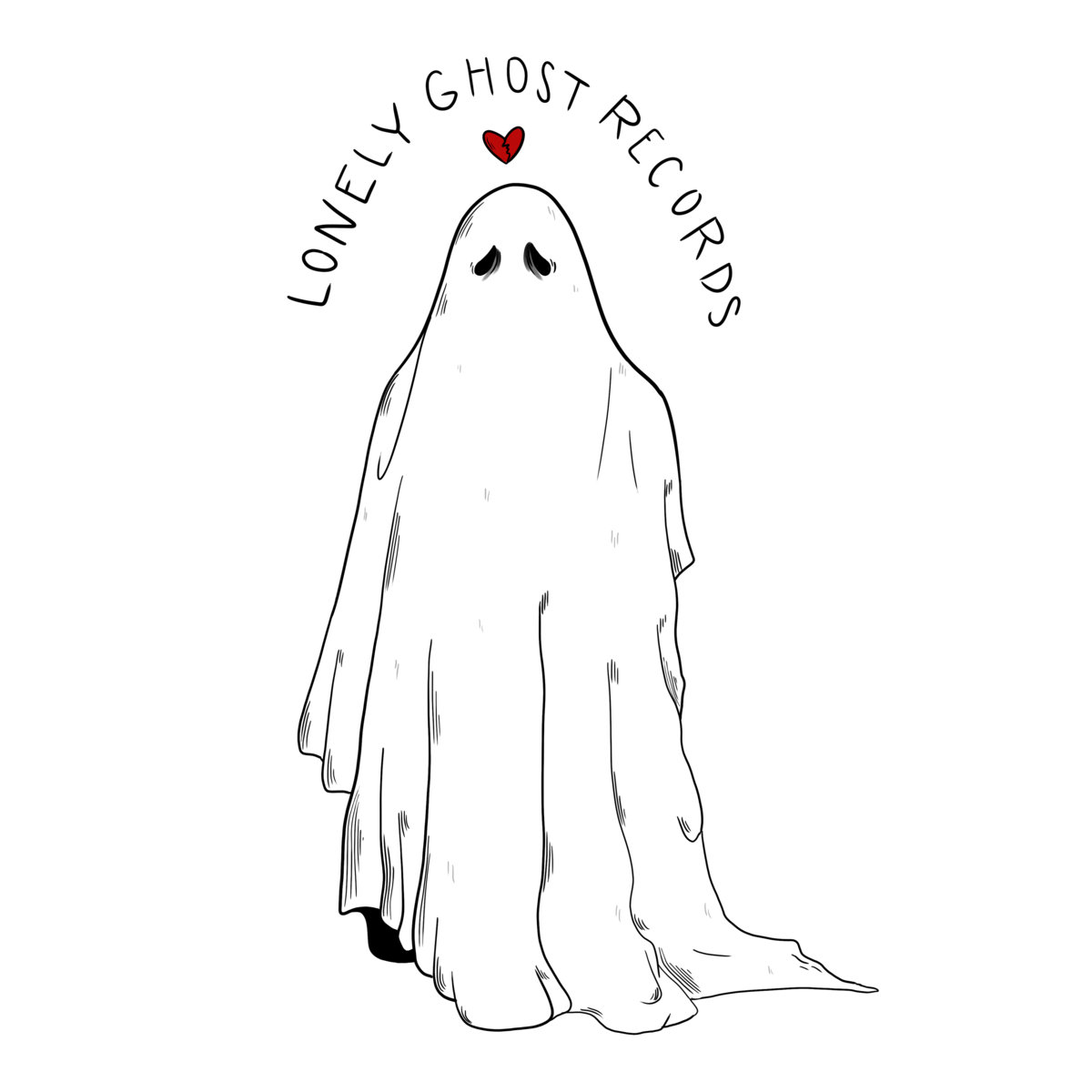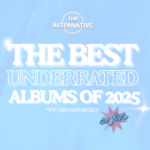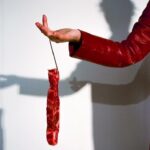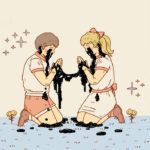Interview: Lonely Ghost Records
Posted: by The Alt Editing Staff

Lonely Ghost Records is an “artist-owned and operated” emo and indie label based out of Columbus, Ohio. Their current roster includes Winnebago Vacation, Superdestroyer, Father of the Year, and more but the people who run the label are effectively anonymous online. Their website refers to them only as John, Shane, and Amanda with attached thumbnails of them draped in ghost outfits. There’s a lot of mystery to this little up-and-coming tastemaker, so we chatted with them to learn more about their socialist ethos and their genre-nullifying mission. Check out our Q&A below:
On your website you describe Lonely Ghost as an “artist-owned and operated label.” How’d you get started?
John: So Shane and I are both on the label. I’m Superdestroyer and Shane’s Father of the Year. I’ve been making music in some form or another probably for close to a decade now and I’ve always wanted to push past just making music and have a sort of community that I could be a part of—something like a label had always interested me. I’d met a lot of artists through Superdestroyer who had a lot of the same struggles I did, making connections, trying to navigate releasing music and cut through the noise of the DIY scene where you have a bunch of talented people making music, so it can be difficult to have anybody hear you. I was meeting all these people, and Shane was starting to make music, and I talked to him like, “What if we started a label, work with some of these people we’re meeting, try and pool our resources together?” We kinda looked at a socialist model of things to see how everyone could contribute something and have it be mutually beneficial.
Shane: One of the other ideas, too, was that a lot of these kids, for lack of a better word, we could help them avoid a lot of the mistakes that we ourselves made. Like John said, he’s been doing this for almost a decade and I’d been helping out on and off. We could give them a better way of getting their music out there in a more efficient way.
John: Not, you know, wasting money and time and falling into people who scam you or let your momentum die. We’re trying to help people be able to focus on music and not have to struggle with everything else.
It seems like collectivism and community are very central to the Lonely Ghost project, and that’s super appealing to me and I don’t think I’ve seen anyone try to structure a label around that. I’m curious why you decided to work with that model?
John: It goes back to me making music in the past. I never really felt supported and when I’d show my music to people, instead of trying to help me grow, they’d say, you know, basically, “If you made a totally different song with different lyrics, instruments, and singing, I’d like it.” Then, you know, it’s like, I didn’t even know where to release my music. I didn’t even know at the time you could digitally release music, and I only ever learned that from talking to people. That helped me move past the initial barriers I encountered and the more that I learned about publishing, I kept meeting other artists who, similarly, didn’t know these things were available to them. This community aspect ended up making everything easier.
Also, there’s all these talented artists I’d meet who had nobody listening or paying attention, which was how it was when I started Superdestroyer. Like, it’s really hard to get anyone to click your Bandcamp link, even. So I wanted to use my platform to help others move past that themselves. Also, it’s been really nice to bounce ideas back and forth. People have such a breadth of ideas that they bring to the table and have these different networks of people. When we support each other, everyone benefits. We also aren’t super interested in making money off the label, so we’re mostly trying to help people make money off their own projects.
Shane: The impetus for starting the label that way is we noticed a lot there’s a lot of predatory entities out there. They’ll take advantage of up-and-coming artists, show them the carrot, so to speak, and then they’re out. We know people who’ve signed contracts, been so excited, then had no access to their music, couldn’t even self-promote. So when we created this community, we don’t want it to be predatory. When we say we’re gonna help you, we’re gonna help you, and that’s the point. The idea with DIY in our system is that we help each other, not just use each other.
John: In my real life, I work in academia, and intellectual property is how you eat. I wouldn’t want to impede on someone else’s intellectual property. I don’t believe in owning someone else’s intellectual property. We don’t wanna impede on someone’s ability to be creative. The way we’ve structured this label is the artists get pretty much all the profits, own their own content, and everybody shares successes.
So is it fair to say you do more distribution than traditional label stuff?
John: We do a little of everything, I suppose. We’re just seriously diving into dealing with PR. We’re an LLC with a lawyer on retainer. We’re looking into booking shows right now. We do a lot of things regular labels do. We do pretty much whatever people are looking for in a small label, we’re just still small. Like, we just bought a tape label so we’ll be able to do our own physicals. We’ll be able to make people tapes at cost, they’ll pay for them at cost, we’ll make them at no extra cost for labor, and they keep the profits once they compensate us for the initial. Similarly, making PR accessible. It’s expensive, but if we’ve got somebody we can give regular work to, that allows us to maybe negotiate costs a little more. Then we can split those costs with our artists so it’s maybe more affordable for everyone involved. We try to make things accessible by making it cheaper and weeding out the people who’re gonna take advantage of you.
Shane: Tangentially related, we don’t directly have certain things on hand, like studio engineers. But that was another initiative too. To find other people who’re up-and-coming in their fields, like sound engineers and people trying to get work doing photography, graphic art, things like that and we’d kinda connect those people. So we’d get people who are new at art, trying to build a portfolio, get them at a reduced cost. We have our artists trying to find people who will do art at a reasonable cost and we’d put them together. Even though our model is nontraditional as a label, we still provide those things you’d look for as an artist on a label.
John: We try to find people because we value art across the board, not just music. People who are trying to find work, and we pay them for that work. We also try to make sure we’re hiring women, people in the LGBTQ community, people of color, try to de-center white male hegemonic structures of power as much as we can too.
So the collective model applies not just to musicians, but to everyone in the music-making and production process?
John: That’s what we try to do, yeah. Anything artistic, really.
How’s it been going so far?
John: It’s moving so much faster than we thought it would. It’s a conversation we had the other day, how far we’ve gotten in seven months. We have a lot of new signees, a lot of stuff coming up, a lot of stuff we’re excited to release. People seem to like it. The people we work with we really believe in and we try to make sure they’re supported and I think it goes a long way. Before we started this, the first thing I did was try and get to know each artist on a personal level, before I even mentioned the label. A lot of these people I tried to know as people, make sure they’re comfortable with me and I’m comfortable with them. I think it’s been more successful than we thought, but also a lot more work.
How do you choose your artists?
John: Do we like your music? That’s step one. Are you good? Step two then is to talk to those people, see if they’d fit into the community. Not in a cliquey sense, but are they gonna be respectful of other people? Are they gonna bring a lot of negativity to the group and shoot things down and make people uncomfortable? We don’t have to all be friends, we don’t have a group chat where we, like, send memes or whatever, but everybody tries to be supportive. We don’t really care about fanbases, ‘cause we’re trying to help people grow. Again, we don’t care to make money as a label, so we just wanna help people access things if their music is good.
Something on your “about” page that really struck me is you’ve got a line about “expanding the definitions of emo,” and I’m kinda curious how you mean that?
John: You see a lot of emo purists, and we’re not that. Most of the people on our label grew up listening to emo, and most of us take a lot of influence from that genre. But we’ve turned that into something else. If you play most people our music, they wouldn’t say, “Oh, this is emo,” but it’s got its roots there, and we feel like it should count. Innovation’s important for any genre, any scene, and if you’re not innovating, you get stagnant. We don’t know what to call a lot of what we hear, but we share a lot of similar roots, so we settled on emo for the descriptor.
Going off of that, some labels have cultivated very specific sounds. Drive-Thru Records, when that was a thing, was a pop-punk label. Topshelf can be considered a math-rock label. You don’t really seem to have a specific sound. Is that something you’ve been trying to do, incorporate a broader range of styles?
Shane: That was something we considered going in. We didn’t wanna lock anyone into one sound. If you wanna be punk one album, then electronic the next album, we’re cool with that. We wanna encourage people to make music however they feel about music. Like, John with Superdestroyer, is a super prolific so he’s a good example. It’ll be a surfy album one album, then like a grungy heavy one the next album. When choosing artists, we decided Lonely Ghost was gonna be a diverse crowd so that everyone feels comfortable experimenting. A lot of times when you see the idea of the quote-unquote genre, there’s a lot of the same thing and it stifles experimentation and creativity and the ways of expressing yourself.
John: Yeah, definitely. A lot of our artists, they haven’t put a lot of stuff out yet, but we’ve heard what they’re working on and there’s some really innovative stuff. We think innovation is important in music and a lot of bands people think are iconic are that way because no one else really sounds like them. Even a lot of bands I like sound good, but you can put on five other artists that’ll scratch that itch. We want it to be, if you wanna listen to Funeral Homes, you’re gonna listen to Funeral Homes. I think that’s part of it, too, is that it feels more real. It’s not forced, ‘cause you can do what you want.
What advice would you give someone trying to start a label?
Shane: The first thing is to do a little bit of research. It’s a lot of work. It’s not impossible, but there have been quite a few times we’ve been like, “Wow, I wasn’t expecting that.” But if you wanna do it, do it. We learn as we go. We could’ve spent months and months planning, and we probably would’ve quit, but we just decided to do it and figure it out as we go. Another thing is to have a plan. We had a framework of things we wanted to accomplish. Like, we wanted to do distribution, so we went after that. Then it was sound engineers, so we did that. Then it was promotion, so we did that. You need to have at least some idea of what you want to do. If you wanted to build a house, right, and you had all this wood and no plans, where would you start? Knowing what we wanted to accomplish was really key.
John: We talk about goal setting a lot.
Shane: At least twice a week!
John: Probably more. One of the things we do is sit down and ask, “What’s today’s goal?” Even if that’s just looking at how one label does things or looking into tape decks. Another thing I’d say is have a partner, and preferably one who’s a little different from you. Like, I have ideas, but Shane’s the one who makes them exist. I’m good at networking, but he knows how bank accounts work. I know I personally couldn’t do this myself. Plus, more people means more resources, so everything’s less expensive that way.
Shane: True, but with that, too many people makes decision-making impossible. It’s gotta be someone you can have open communication with, too, or it’s not gonna work.
What has Lonely Ghost got planned for the rest of 2019?
John: We have three LPs coming out, at least two EPs, and a few music videos. We’ve got a big second half of the year planned. We’ve got a couple more people joining the label, too.
Follow Lonely Ghost on Bandcamp, Twitter, and Youtube.
—
Zac Djamoos | @greatwhitebison
The Alternative is ad-free and 100% supported by our readers. If you’d like to help us produce more content and promote more great new music, please consider donating to our Patreon page, which also allows you to receive sweet perks like free albums and The Alternative merch.










